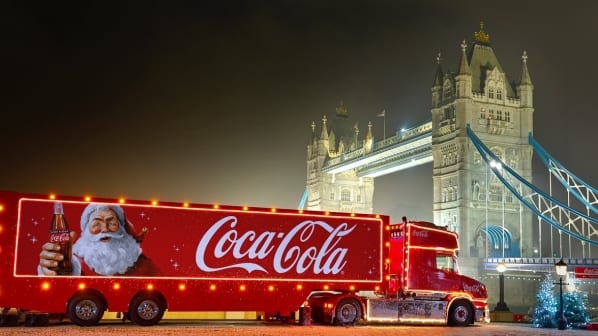As December begins, so do the preparations for the holidays. In many places of the world, the streets are already lit up. It will not be long until Coca-Cola’s trucks start circulating – a practice that is years old. The so-called Christmas Caravan started out as a commercial in 1995, coming to life with a trip across the US in 2001 and debuting in the UK in 2010. The Coca-Cola truck is currently on a 19-stop tour from Edinburgh to London, and will be distributing free cans of Coke along the way.
The Christmas Caravan remains an intrinsic part of Coca-Cola’s commercials for the season. The official ad for 2019, “Holidays Are Coming”, starts with a child listening to a story from his grandfather: “Then the trucks came over the hill…”. Coca-Cola trucks start making their way through the snow while children watch amazed. The UK version seems to be slightly shorter, but still focuses on children being in awe. Of course, this is all part of a coordinated strategy: according to a former Coca-Cola employee, real-life trucks “made the ads resonate a little bit more”. Nowadays, there are even toy replicas of Coca-Cola trucks just a click away.
 Despite this, Coca-Cola boasts about its policy of “responsible marketing”. They have pledged not to market any products directly to children under 12. Specifically, the company publicly says that it “will not design […] marketing communications in a way that directly appeals to children under 12” (emphasis added). This issue has already been addressed in a report by the Center for Science in the Public Interest called Marketing Coke to Kids: Broken Pledges, Unhealthy Children, which dives into the technicalities of the Coca-Cola’s pledge and reaches the conclusion that the company is not living up to the spirit of their undertaking.
Despite this, Coca-Cola boasts about its policy of “responsible marketing”. They have pledged not to market any products directly to children under 12. Specifically, the company publicly says that it “will not design […] marketing communications in a way that directly appeals to children under 12” (emphasis added). This issue has already been addressed in a report by the Center for Science in the Public Interest called Marketing Coke to Kids: Broken Pledges, Unhealthy Children, which dives into the technicalities of the Coca-Cola’s pledge and reaches the conclusion that the company is not living up to the spirit of their undertaking.
Coca-Cola’s Christmas Caravan has not gone without opposition from the public health community. In the UK, for example, there have been protests in multiple cities, forcing Coca-Cola to scale back the tour in past years. Also, the head of public health in the National Health Service has already urged authorities to ban visits from the caravan, saying that it “[did] nothing to help families make healthy choices and wider efforts to combat childhood obesity and rotten teeth.” His comments came out as Public Health England’s research found that most of the places the trucks planned to visit that Christmas had above-average rates of children with obesity or tooth decay.
Following criticism, this year Coca-Cola announced it would be mostly distributing zero-sugar products in their UK tour. However, a NHS consultant in Pediatric Dentistry warns that “[a]ll drinks are harmful, including the zero sugar version,” and adds: “The motive for the tour can only be to encourage consumption of Coca-Cola brands.” In addition to the harm to teeth, it is also worth remembering the study published this year in the Journal of the American Medical Association linking sugar-free sodas to a higher risk of death. That is, in any case it is hardly appropriate for Coca-Cola to carry on with a marketing campaign that so obviously appeals to children.
Coca-Cola trucks will soon be circulating, and we know children will be watching. The rest of us should also pay careful attention in order to take action.



